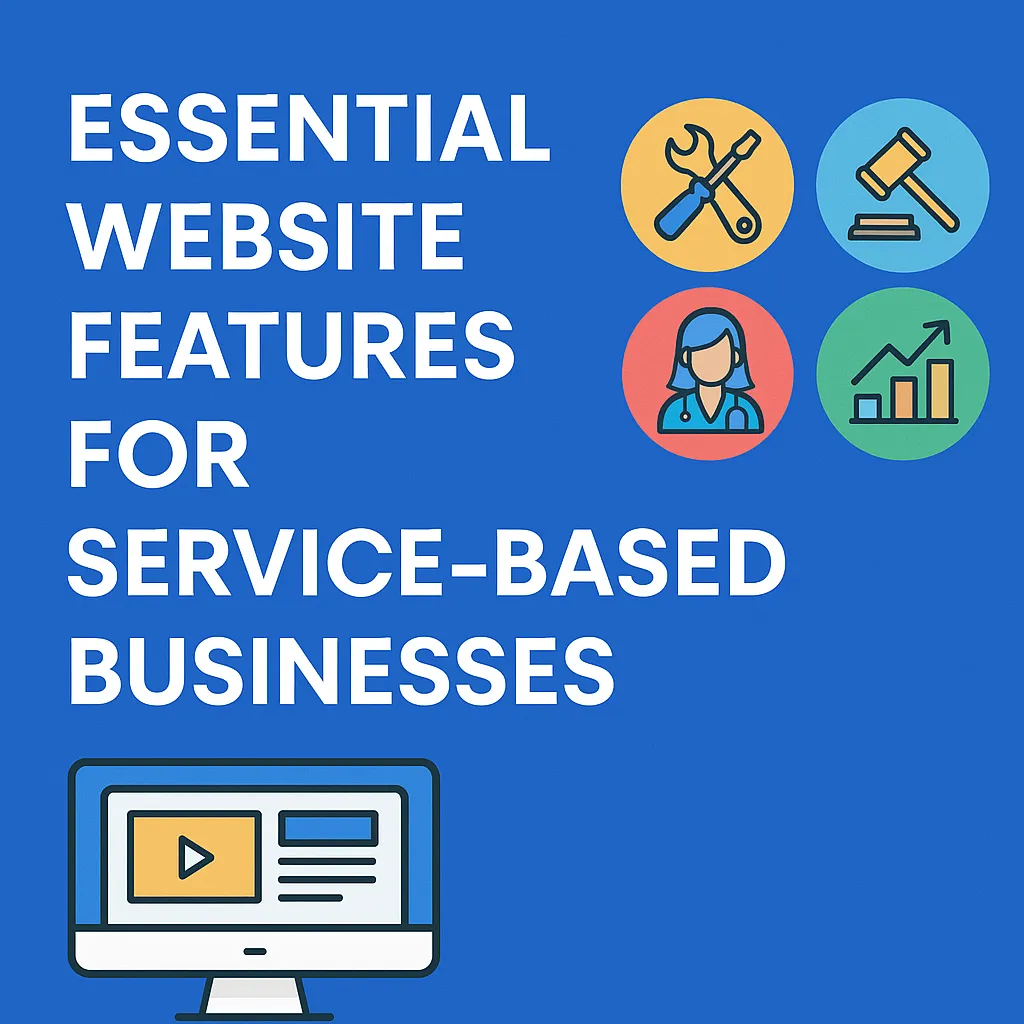
Essential Website Features for Service-Based Businesses
Essential Website Features for Service-Based Businesses in 2025
SEO Title:
Essential Website Features Every Service-Based Business Needs in 2025
Meta Description:
Discover the top website features service-based businesses must have in 2025. Learn how to improve UX, boost local SEO, increase conversions, and avoid costly design mistakes.
Introduction
In today’s fast-paced, mobile-first world, service-based businesses can no longer afford to treat their websites as static brochures. With over 97% of consumers turning to the internet to find local services, a strategically designed website is no longer optional—it’s essential.
Whether you’re a contractor, consultant, medical practice, law firm, or creative agency, your website is often your first impression—and it needs to work 24/7 to convert visitors into paying customers.
This guide explores the must-have website features for service-based businesses to thrive in 2025 and beyond. From mobile optimization and real-time communication to SEO structure and high-converting calls-to-action, you’ll learn how to turn your website into a powerful client acquisition engine.
Understanding the Concept: Definition and Key Concepts
A service-based business website is a digital platform for companies that offer intangible services rather than physical products. Examples include HVAC contractors, law offices, beauty salons, marketing consultants, and more.
Modern service websites are lead-generation hubs that combine intuitive design, trust-building content, real-time engagement tools, and localized SEO.
Key Concepts Include:
Conversion-Centered Design: Every visual and textual element should guide users toward an action (e.g., book, call, fill out a form).
Mobile-First Development: Sites must be fast, thumb-friendly, and fully responsive.
Local SEO: Improve visibility in local searches by targeting geo-specific queries.
Trust Elements: Client testimonials, certifications, review integrations, and case studies build credibility.
Instant Communication: Chatbots, live chat, or click-to-call buttons shorten the lead response cycle.
Why It Matters for Today’s Businesses
Studies show that:
87% of consumers read online reviews for local businesses before converting
92% check a business’s website before reaching out
Google now favors sites with Core Web Vitals, security, and mobile usability
In this context, your website must differentiate your brand with frictionless UX, local relevance, and personalized communication.
Case in point: An insurance agency added local landing pages and Google Reviews integration—leading to a 40% spike in form submissions within 6 months.
Effective Strategies to Master the Concept
Step 1: Prioritize Speed and Mobile Optimization
Slow-loading websites frustrate users and increase bounce rates.
Tactics:
Use WebP images
Minify CSS & JavaScript
Enable caching via Cloudflare
Test with Google PageSpeed Insights & Mobile-Friendly Test
Step 2: Implement Clear Calls-to-Action (CTAs)
CTAs drive conversions.
Tips:
Place CTAs in headers, service pages, and every scroll-depth
Use action-oriented language: “Get a Free Estimate,” “Book Today,” etc.
Ensure CTA buttons contrast visually with the page
Step 3: Focus on UX and Navigation
Intuitive navigation ensures users can find what they need quickly.
Best Practices:
Use a sticky navigation bar
Organize services under drop-down menus or sections
Follow the “three-click” rule for key pages
Step 4: Build Content That Builds Trust
Clients want proof you can deliver.
Content Must-Haves:
SEO-optimized service pages
Case studies with real metrics
Staff bios with credentials
Testimonials with names and photos
Blog content that answers FAQs
Step 5: Follow SEO & Performance Best Practices
SEO builds sustainable visibility and traffic.
On-Page SEO:
Use keywords in H1, H2s, meta titles, and image alt text
Include internal links to related content
Use structured data/schema for services and reviews
Local SEO:
Maintain an accurate Google Business Profile
Embed Google Maps on your contact page
Include NAP consistency (Name, Address, Phone) across directories
Technical Essentials:
Install an SSL certificate
Use ADA-compliant colors and alt tags
Leverage CDN tools like Cloudflare to improve speed and security
Common Mistakes Businesses Should Avoid
Mistake 1: Ignoring Mobile Responsiveness
Over 70% of web traffic is mobile. A non-responsive site causes higher bounce rates and lower conversions.
Mistake 2: Lacking Strong CTAs
A beautiful design means nothing without direction. Guide users clearly with purpose-driven CTAs.
Mistake 3: Failing to Optimize for Local SEO
Generic content won’t help service businesses that rely on local clients. Geo-targeted keywords and local business citations are essential.
Mistake 4: Overcomplicating the Design
Avoid bloated animations and unnecessary plugins. Users prefer clarity, speed, and simplicity.
Getting Started: Practical Steps
Audit Your Existing Website
Use Google Lighthouse and SEMrush to evaluate load speed, accessibility, and SEO.
Identify gaps in CTA placement, local SEO, and mobile performance.
Define Clear Conversion Goals
Do you want users to book appointments? Request a quote? Sign up for a free consultation? Your site should reflect this.
Choose the Right Tools
CRM & Automation: Go HighLevel (GHL), HubSpot
Analytics: Google Analytics 4, Hotjar
SEO Tools: Ahrefs, Semrush
Page Builders: WordPress with Elementor, GHL’s site builder
Create a Content Calendar
Map out blogs, location pages, seasonal promotions, and testimonials to consistently improve SEO and user engagement.
Optimize Continuously
Monitor conversion rates and bounce rates
A/B test CTAs and form designs
Update old content based on performance insights
Conclusion: Your Website Is Your Growth Engine
Your service-based business website isn’t just a digital placeholder—it’s your most important sales tool in 2025. By focusing on conversion-driven design, local SEO, mobile optimization, and trust-building features, you can ensure your site is working around the clock to attract and convert leads.
Don’t just be found—be chosen.
